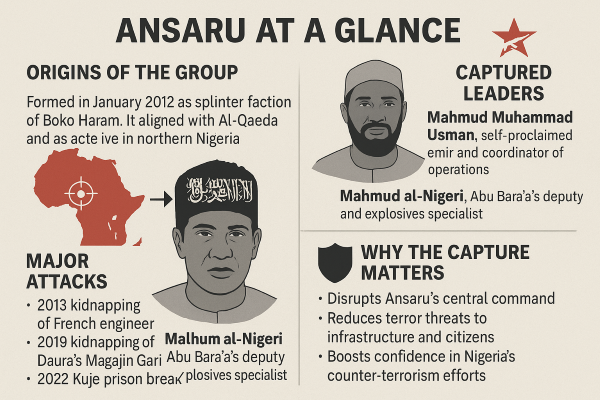Nigeria Lands Decisive Blow Against Terrorism with Capture of Top Ansaru Commanders – Ribadu

Nigeria’s counter-terrorism architecture recorded a watershed victory between May and July 2025, with the capture of two of the world’s most wanted jihadist leaders—Mahmud Muhammad Usman (Abu Bara’a) and Mahmud al-Nigeri (Mallam Mamuda), the emir and deputy commander of the Al-Qaeda-linked Ansaru group.
The announcement by National Security Adviser (NSA), Mallam Nuhu Ribadu, signals a new phase in Nigeria’s fight against extremist violence—one that showcases intelligence sophistication, inter-agency synergy, and a renewed political will under President Bola Tinubu’s administration.

Ansaru: From Boko Haram Splinter to Global Jihad Franchise
Founded in January 2012 as a “humane alternative” to Boko Haram, Ansaru quickly revealed its militant core. Flying the Al-Qaeda in the Islamic Maghreb (AQIM) insignia, it embedded itself across northern Nigeria, cultivating both urban sleeper cells and forest strongholds in Kainji National Park, Niger and Kwara States, spilling into Benin Republic.
The group’s leadership fused local grievances with international jihadist networks. Mamuda, for instance, trained in Libya between 2013 and 2015 under instructors from Egypt, Tunisia, and Algeria—specialising in weapons handling and IED fabrication. Together with Abu Bara’a, they orchestrated some of Nigeria’s deadliest terrorist operations.
The Men Behind Nigeria’s Darkest Attacks
Both men top Nigeria’s most-wanted list, with a chilling record of operations:
- 2022 Kuje Prison Break, which freed hundreds of hardened militants.
- Attack on Niger’s uranium facility, heightening regional nuclear-security concerns.
- 2013 kidnapping of French engineer Francis Collomp in Katsina.
- 2019 abduction of Magajin Garin Daura, Alhaji Musa Umar Uba.
- Abduction of the Emir of Wawa in Niger State.
Their terror campaign extended far beyond Nigeria’s borders, with operational ties to jihadist cells in Mali, Niger, and Burkina Faso.
Strategic Breakthrough: Anatomy of the Capture
According to Ribadu, the operation was “high-risk, intelligence-led, and precision-executed”, combining:
- Months of surveillance and human intelligence (HUMINT).
- Technical tracking capabilities, including digital intercepts and satellite monitoring.
- Inter-agency coordination, with Nigeria’s armed forces, DSS, NIA, and police forming a rare seamless synergy.
The captures were effected in and around Kainji National Park, a notorious haven for extremists, and yielded digital evidence and weapons caches now undergoing forensic analysis.
Why This Matters: Security and Economic Implications
The capture represents more than a tactical win—it decapitates Ansaru’s central command. For Nigeria, this means:
- National Security Confidence: Demonstrates capability to dismantle entrenched terrorist leadership, boosting troop morale and public trust.
- Investor Confidence: International financiers, especially in infrastructure and extractives, often cite terrorism as a top investment risk. Neutralising high-value targets signals a safer environment for capital inflows.
- Regional Stability: With Ansaru’s operations tied to cross-border jihadist economies—arms trafficking, kidnapping-for-ransom, and illicit trade—their capture weakens the Sahel’s broader terror-financing networks.
The Road Ahead: No Room for Complacency
While this operation is historic, experts warn that splinter cells often adapt quickly. Nigeria’s challenge lies in:
- Exploiting intelligence from seized materials to dismantle residual networks.
- Strengthening border security, especially across Niger and Benin Republic.
- Sustaining political will, ensuring this breakthrough translates into long-term suppression of jihadist insurgencies.
Ribadu was emphatic: “This is the beginning of the end of impunity for terrorist leaders in Nigeria.”
Conclusion: A Defining Moment for Nigeria’s Counter-Terrorism Architecture
The capture of Abu Bara’a and Mallam Mamuda marks the most significant blow against Ansaru since its inception. It showcases Nigeria’s evolution from reactive counterinsurgency to intelligence-driven counter-terrorism.
For policymakers, investors, and citizens alike, the message is clear: Nigeria is regaining control of its security landscape. But the fight is far from over—the next phase will test the country’s ability to consolidate gains, dismantle residual networks, and prevent the rise of new extremist offshoots.










